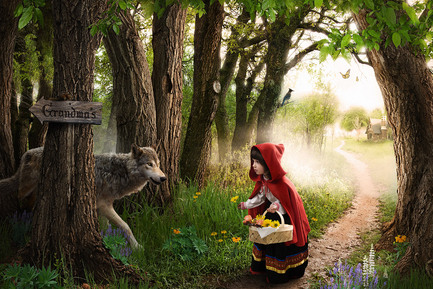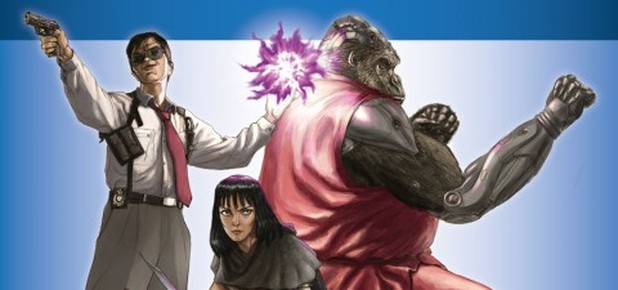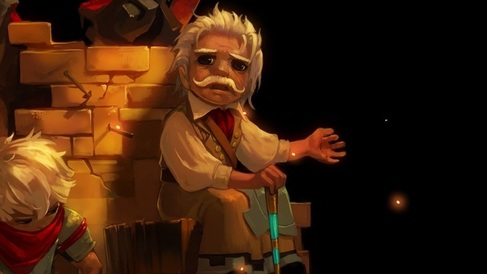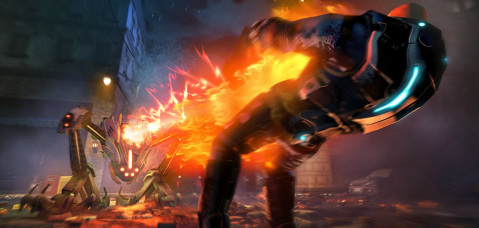Readers and critics often talk about plot holes, those spots in a story where the writer didn't explain how the characters got from the crashing airship to the top of the volcano without getting hurt.
Recently, I spoke to a group of people at my work to explain how you write a game story, and it felt a lot like writing intentional plot holes into a story. I went with Little Red Riding Hood as an example. Of course, this has already been made into a game called The Path, but I haven't played it so this isn't about that one. Here is a rough transcript of my short talk:
As a writer, sometimes my job is to decide whether the made up word “dino puffle” is hyphenated, or whether Captain Rockhopper is actually a pirate or just an inveterate liar. But mostly, my job is (in collaboration with dozens of other people) to create a place for stories. Which is a little different than telling a story. Think of it as trying to trick a player into telling you a specific story.
Let's use Little Red Riding Hood as an example. You are allowed to tell the player what they are capable of, where the story takes place, what the other characters are doing; but you can't tell the story. How do you make them tell you the story of Little Red Riding Hood?
In games, the star of the story, the main character, is the player. But you don't know your main character, not even their gender or age. So our story cannot start, “Once upon a time, there was a girl named Little Red Riding Hood that went into the woods to see her Grandmother”. Instead, our story starts, “Once upon a time, there were woods, your Grandmother lives in them, and there is a path to get there.”
Game stories are often told through details---art, sound, and other elements of the world reinforce the story that we want the player to tell. Our Red Riding Hood was told that she must stay on the path on the way to her Grandmother's house. So when our player/Red Riding Hood comes to the shortcut through the woods, what does it look like? Is the art foreboding and dark? Does the regular path look a little boring from here on out? Can we use music to bring up some tension at this point? These details are incredibly important to giving the player what they need to tell their story.
Another key part of stories is the driving reason for action. The thing that makes this particular part of these characters' lives worth telling. Why does it matter if Red Riding Hood gets to her Grandma?
It is a very different story if I say “Red Riding Hood was out one day picking flowers. On the other side of the scary woods, her grandmother was sick. Her grandmother died." It's still a story, and one driven by the player, but we don't want to tell it. So, we give our player the information that Red has medicine and food for her grandma.
Consequently, our player's actions must affect the world in ways that we set up. When she gives her the medicine and food, and Grandma gets better. We wouldn't want to forget this facet, and leave Grandma simply standing there, freshly arrived from the wolf's stomach.
If we give our players the setting, and some characters, and some reasons for action, will they tell us the story of Little Red Riding Hood? Probably something similar, but each one will be a little bit different. Each one will be their story of saving Grandma from the big bad wolf. Though I'm the writer of the game, I am not the only one telling a story. The players will tell the stories, and I work to make them as compelling and rich as possible.
Bonus! - I've described this as a single-player game. But I'd be curious to see how it would change as a multiplayer game or an MMO. If anyone feels like tackling that, post it in the comments.
Recently, I spoke to a group of people at my work to explain how you write a game story, and it felt a lot like writing intentional plot holes into a story. I went with Little Red Riding Hood as an example. Of course, this has already been made into a game called The Path, but I haven't played it so this isn't about that one. Here is a rough transcript of my short talk:
As a writer, sometimes my job is to decide whether the made up word “dino puffle” is hyphenated, or whether Captain Rockhopper is actually a pirate or just an inveterate liar. But mostly, my job is (in collaboration with dozens of other people) to create a place for stories. Which is a little different than telling a story. Think of it as trying to trick a player into telling you a specific story.
Let's use Little Red Riding Hood as an example. You are allowed to tell the player what they are capable of, where the story takes place, what the other characters are doing; but you can't tell the story. How do you make them tell you the story of Little Red Riding Hood?
In games, the star of the story, the main character, is the player. But you don't know your main character, not even their gender or age. So our story cannot start, “Once upon a time, there was a girl named Little Red Riding Hood that went into the woods to see her Grandmother”. Instead, our story starts, “Once upon a time, there were woods, your Grandmother lives in them, and there is a path to get there.”
Game stories are often told through details---art, sound, and other elements of the world reinforce the story that we want the player to tell. Our Red Riding Hood was told that she must stay on the path on the way to her Grandmother's house. So when our player/Red Riding Hood comes to the shortcut through the woods, what does it look like? Is the art foreboding and dark? Does the regular path look a little boring from here on out? Can we use music to bring up some tension at this point? These details are incredibly important to giving the player what they need to tell their story.
Another key part of stories is the driving reason for action. The thing that makes this particular part of these characters' lives worth telling. Why does it matter if Red Riding Hood gets to her Grandma?
It is a very different story if I say “Red Riding Hood was out one day picking flowers. On the other side of the scary woods, her grandmother was sick. Her grandmother died." It's still a story, and one driven by the player, but we don't want to tell it. So, we give our player the information that Red has medicine and food for her grandma.
Consequently, our player's actions must affect the world in ways that we set up. When she gives her the medicine and food, and Grandma gets better. We wouldn't want to forget this facet, and leave Grandma simply standing there, freshly arrived from the wolf's stomach.
If we give our players the setting, and some characters, and some reasons for action, will they tell us the story of Little Red Riding Hood? Probably something similar, but each one will be a little bit different. Each one will be their story of saving Grandma from the big bad wolf. Though I'm the writer of the game, I am not the only one telling a story. The players will tell the stories, and I work to make them as compelling and rich as possible.
Bonus! - I've described this as a single-player game. But I'd be curious to see how it would change as a multiplayer game or an MMO. If anyone feels like tackling that, post it in the comments.




 RSS Feed
RSS Feed